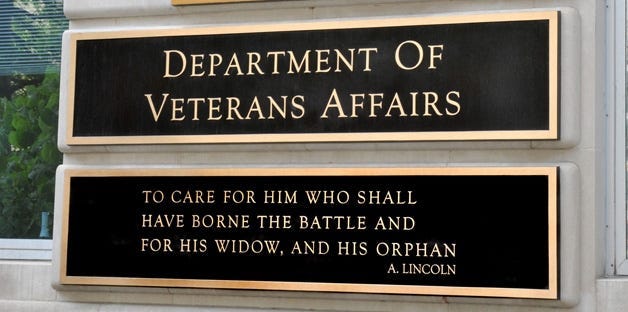
The Department of Veterans Affairs says it plans to prioritize benefits for certain Agent Orange-exposed veterans, veteran suicide prevention, a new electronic health record system and caregiver benefits in 2020.
VA spokeswoman Christina Mandreucci described them as 2020 "milestones" for VA.
Agent Orange
In January, "VA will do something past administrations did not: begin deciding presumptive claims for Blue Water Navy veterans," Mandreucci told Connecting Vets.
VA said it began processing Blue Water Navy Vietnam veteran claims for Agent Orange disability benefits on Jan. 1, 2020. It was not, however, a VA-led initiative -- it was Congressionally mandated in the Blue Water Navy Vietnam Veterans Act passed by Congress and signed into law by President Donald Trump in 2019.
VA delayed deciding those claims until 2020 after the legislation passed, as first reported by Connecting Vets, prompting at least one lawsuit from veterans.
Suicide prevention
Members of Congress who head up committees dedicated solely to veterans' issues made suicide prevention a top priority in 2019 and 2020, especially when the rate of veteran suicide -- about 20 per day -- hasn't budged despite significant increases in federal spending funneled to VA.
VA says it plans to continue that focus this year.
"VA will continue working to find solutions to the biggest challenge of our time: preventing veteran suicide," Mandreucci said of VA's continued work on veteran suicide.
Specifically, Mandreucci said VA needed "bipartisan cooperation from Congress" to pass the Improve Wellbeing for Veterans Act, a bill to provide grants to private organizations working to combat veteran suicide in their communities. That bill sparked controversy between Republicans and Democrats in committee and between majority leadership and Wilkie in 2019.
Republicans and Democrats sparred over how much oversight the grants required and which groups could be eligible to receive them. Majority leadership argued it was "inappropriate" for Wilkie and his staff to lobby Congress members to pass the bill.
In March, VA plans to submit the "PREVENTS national roadmap to prevent veteran suicide" to the White House, Mandreucci said.
The President's Roadmap to Empower Veterans and End the National Tragedy of Suicide (PREVENTS) task force is a cabinet-level team launched by the VA and White House to develop a national plan to address veteran suicide. The plan is expected to include a "community integration and collaboration proposal, a national research strategy and an implementation strategy," according to VA.
Electronic health records
VA plans to "go live" with a new electronic health record system in March at five sites: the Mann-Grandstaff VA Medical Center in Spokane, Wash. and its four community clinics, Mandreucci said.
The new electronic health records are planned to be universal -- a single health record to follow a service member throughout their career and after and be available to any care provider they might see.
Lawmakers so far have expressed doubt that VA and the Defense Department will meet deadlines for establishing universal electronic health records.
Veterans also will now have to opt-out if they don't want VA to share their medical records with its community care providers, and VA has remained largely silent on measures to protect veteran data.
Veterans can now access some of their health records on iPhones, VA announced in November.
Caregivers
By summer 2020, Mandreucci said VA plans to make caregiver benefits available for veterans injured on or before May 7, 1975 "finally making these important benefits available to veterans from the Vietnam era," she said.
VA already missed the Oct. 1, 2019 deadline to roll out assistance to pre-9/11 veterans' caregivers, delaying the expansion of the caregiver program to this summer at the earliest. The expansion was a Congressionally mandated requirement under the MISSION Act, which replaced the Choice Act in June 2019 and originally passed by Congress and the president in 2018. Benefits for the program include monthly stipends, medical training, health insurance and more.
This follows VA reportedly failing to adequately manage its existing caregiver program, including arbitrarily cutting veteran caregivers from the program entirely, despite plans to expand, according to the Inspector General.
Mandreucci said VA is seeing more patients than ever before, more quickly than ever. VA completed more than 59.9 million internal appointments last year -- a record high and about 1.7 million more than 2018.
VA has "implemented an unprecedented set of reforms to improve care and benefits" for veterans and is "looking forward to building on those successes in 2020," she said.
VA spokespeople denied repeated requests for comment from Secretary Robert Wilkie on his 2020 priorities for the department.
Congressional Veterans Affairs leaders lay out 2020 priorities
-
